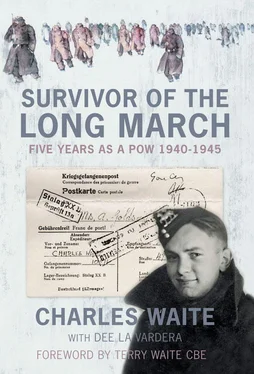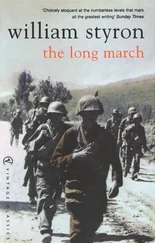‘Another camp,’ said Laurie. ‘Wonder what they’ve got in store for us.’
‘Nothing good,’ said Heb.
‘A change is as a good as a rest,’ said Sid.
‘It’s freezing out there!’ I said. Little did we know that the winter of 1945 turned out to be one of the worst of the twentieth century with temperatures falling as low as -25°c. ‘Abso–bloody-lutely freezing!’ I added.
Jimmy echoed my sentiments with something incomprehensible.
‘Hope it’s not far,’ said Heb. ‘I’m exhausted just thinking of going.’
We all thought we were moving to another work place. We had no idea that the Russians were advancing and the war was coming to an end. It would have been so much better for us if we had known what was going on so we could have made plans. Bloody silly time to move. Why couldn’t they wait until the weather got better? We had no idea what was in store.
I had never really stopped to think about what would happen at the end of the war. I always wondered how we would know it was over and how we would get back to England. I didn’t imagine that it would end like this – our journey back to freedom and civilisation.
As soon as we left the camp and passed through the gates and wire fences, we realised we weren’t off to another work place. Everybody was there – officers, guards, the lot – and we knew something big was happening. No idea where we were going but I just knew this looked like big trouble. Memories of that first march from Abbeville to Trier and journey by the cattle truck came back to me. That’s where it had all started.
I did the silliest thing when I knew we were leaving. Like everybody else we wanted to take everything we had. Over time fellows had collected or made quite a few knick knacks and souvenirs: matchstick models, animals and figures whittled from wood, stones picked and polished. Some had Red Cross boxes and bags that they had begged, borrowed or stolen. I got into one of the barns where I remembered seeing some storage boxes. That’d be good for carrying my stuff, I thought. I didn’t expect we were going far. If I could find a really strong cardboard box, not too heavy, I would put all my belongings in it.
My letters were the most precious things I possessed and I had a real stack of them. Nearly five years’ worth. I wasn’t going to leave them behind. I had odds and ends left from my last Red Cross parcel (bit of chocolate, some biscuits and a few cigarettes). I had my spoon and bowl, shaving kit, towel, bit of soap, spare pair of socks, trousers and my old boots.
I decided to wear my new boots which my mother had sent me, and keep the old ones as spare. Because of the extreme cold, I was already wearing pretty much all the clothes I owned including my spare underwear and my fireman’s jumper over my uniform. I packed my old boots and everything else neatly inside the box and tied it up with some string – the stuff made from twisted brown paper which came with the Red Cross parcels. I was ready to go.
What on earth did I look like? There I was holding this huge box out in front as though I was Father Christmas looking for some kiddies to give them their presents. I soon realised how stupid I was. There I was battling through the snow drifts against the icy winds, my arms aching and my feet skidding on the slippery ice-impacted roads as I tried to keep up with the other men marching out into the white wilderness.
I wasn’t alone though in trying to carrying everything. Nobody had said, ‘Look men, take only what you can eat or wear. Dump everything else.’ It could have saved a lot of trouble later on. Me and the other chaps soon started throwing things away as we went along, to lighten our load and make it easier to walk and not fall behind the column. We kept the absolute essentials and ditched everything by the roadside. God, how I wish we could have kept it all. We had little enough to show for our five years of slave labour but it was all precious to us.
So that was how I came to lose all my letters and cards from home and most of my photos. I kept two envelopes, from mother and Lily’s last letters, and placed a couple of family photos inside along with my Army Service Pay Book. I’m looking at the Pay Book now. It’s not actually in that bad a condition considering what it went through; amazing it has survived. The cover is creased and water stained and it still smells of tobacco smoke. On the inside pages I can read about the vital statistics of my younger self, that I weighed 130lbs and was medical classification ‘A’ on enlistment. I can also pride myself that I fulfilled the Instructions to Soldiers ‘You will always carry this book on your person.’ I had my dog tag round my neck, the belt my friend made from the tops of old army boots round my waist and everything else stuffed into my many pockets.
Jimmy, of course, was better equipped. He was born to be out of doors and always on the go. Like a good Boy Scout, or gamekeeper, I should say, he knew to ‘be prepared’. He always carried an assortment of useful things about his person: stub of pencil, needle, matches, knife, bits of old wire and string. And on The March, true to form, he was always on the lookout for things to make our lives better, opportunities to search the area and any empty houses along the way.
When we left camp Jimmy had a rucksack made from a hessian animal feed bag on his back. I’m not sure if he had found the bag and stitched it together himself or our tailor friend had made it. He kept all his stuff in there including his tartan trews, which he changed into when the weather got better months later and the sun was shining, I enjoyed watching him up in front, head held high, tartan legs striding along, and the ribbons on his Highland cap fluttering behind.
39 men.
Left the farm at Langenau [20 January] 2 men stay in hiding.
Everybody in good spirits.
It was Saturday (one of our rest days) when the camp was evacuated. No rest for us though. We had started with forty-five men in the camp back in 1940, lost a few, gained a few and were down to forty-one. When the officer took the roll call there were two men missing and a couple of guards were sent to look for them. Our two chaps didn’t appear and we never heard any shots fired so maybe they got away. God knows where they went. To the coast to find a boat? Madness. In the end the guards were called back and we set off on foot down the road.
The Germans had loaded two small horse-drawn carts – one full of supplies, including some Red Cross parcels, and their equipment; the other nearly empty. This was later used to fetch bread from villages where a bakery was still in business, and also to carry those too ill or injured to walk. I remember looking at the horses thinking they looked in better condition than us. There were bags of feed on the cart for them but it wasn’t enough for a long journey in the middle of winter.
Of course, the guards were more worried about keeping the horses fed than us prisoners. We felt sorry for the creatures. They were doing a good job so we kept an eye open for hay when we stopped off somewhere. If we kipped in a barn or stable we grabbed a handful of straw and fed them when we could. I remember Laurie saying, after we’d been a month on the road when everybody, including the horses, looked on their last legs: ‘If one of the nags goes down, at least we’re in with the chance of a decent meal.’ Those horses turned out to be lot tougher than us.
[21 January]March 42km. Nearly all of us throw away a lot of kit.
Much too heavy to carry
It was on the second day that the dreadful weather conditions got the better of us and I and most of the other men realised the folly of struggling to carry bundles, boxes, bags, whatever, of belongings. Nearly everybody started throwing things away as they went along. You could look back and see a trail of discarded items. During an early stop, I said, ‘I can’t be doing with this!’ and tipped out the box leaving everything in the snow except my bit of food, cigarettes, piece of soap, socks, and my spoon and bowl. What I couldn’t fit into in my already filled coat pockets got left behind.
Читать дальше




![Джеффри Арчер - The Short, the Long and the Tall [С иллюстрациями]](/books/388600/dzheffri-archer-the-short-the-long-and-the-tall-s-thumb.webp)







